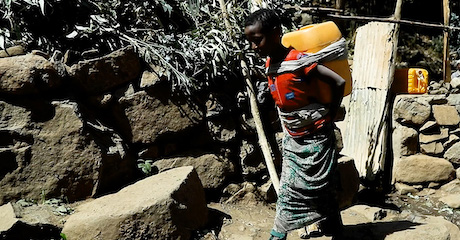Zufan, 10, of Mymereb, Ethiopia, does not go to school. Instead, she spends her days doing domestic chores, including fetching water far from home.
“It is too much to carry,” Zufan says as she straps the yellow jug to her back and pushes forward to begin the walk home. “In the future, I would like to go to school, like some of my friends.”
When girls are out of school, they face a number of risks — including being forced into early marriage
In Ethiopia and across the Horn of Africa, families have grown increasingly desperate to survive as drought conditions take hold. Water scarcity is not only a burden on girls; it destroys livelihoods, fueling food insecurity, and displaces families, disrupting schooling for both boys and girls.
According to UNICEF, from April through June, 2022, the number of children in Ethiopia, Kenya and Somalia at risk of dropping out of school tripled from 1.1. million to an estimated 3.3 million children due to drought in the Horn of Africa — the worst climate-related crisis in 40 years.
For girls who are out of school, there is often an increased risk of being forced into early marriage. Child marriage, or marriage before age 18, is a human rights violation under the Convention on the Rights of the Child.
In Ethiopia and across the Horn of Africa, UNICEF is working with partners to deliver lifesaving assistance and blunt the drought’s many impacts. By working to improve access to safe water for drinking, cooking and personal hygiene as part of a broader humanitarian action plan, UNICEF can help ease the water burden on girls like Zufan and help get them back to learning.
Support UNICEF’s mission to help girls get back to school, stay in school and reach their full potential. Donate today.
Top photo: Zufan, 10, of Ethiopia, carrying a heavy jug of water back from the community tap, a daily chore that keeps her out of school. © UNICEF 2022. Video edited by Tong Su for UNICEF USA.
